


Q. Why has JAXA started to recruit Japanese astronauts for the first time in ten years?
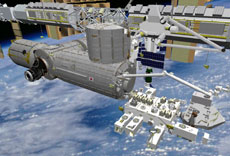
Japanese Experiment Module "Kibo"

In March of this year, with Astronaut Takao Doi on board, assembly of the Japanese Experiment Module “Kibo” began. The first Japanese space facility was born, and many Japanese space expeditions will follow.
At the beginning of 2009, Astronaut Koichi Wakata will become the first Japanese person to take part in a long-duration expedition, lasting about three months. Five or six Japanese astronauts will stay on the ISS for a total of about 900 days from 2008 to 2015.
More Japanese astronauts will be required than the six we now have, since each mission will require several backup astronauts, and training and preparations before the launch take quite a long time. JAXA must begin to recruit new astronauts now to prepare for these future needs.
Q. How will this recruitment affect future Japanese manned space activities?
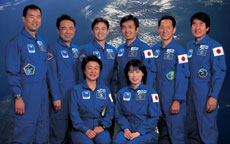
JAXA's Astronauts
For the moment, it seems likely that Japanese astronauts will focus their efforts mainly on the ISS expeditions. NASA is planned to operate the ISS till 2015, and any extensive operations after that will be decided at a meeting among the international partners. I believe that it is very likely that the ISS mission will be extended.
Japanese manned space activities have originally been promoted together with the ISS program, which the United States actually started in 1985. In 1988, Japan decided to join the program, and Astronaut Mamoru Mohri became the first Japanese person to participate in a Space Shuttle mission in 1992. Under the initial plan, the ISS was scheduled to be completed by around 1994, but due to Space Shuttle accidents and other issues, the program was extensively delayed.
Astronauts Chiaki Mukai, Takao Doi, Koichi Wakata, Soichi Noguchi and Akihiko Hoshide followed Astronaut Mohri into space. Up to now, Japanese manned space activities have been performed mainly to get experience in space on Space Shuttle flights, in order to train astronauts and develop manned space flight technology. By developing and launching the Kibo module, Japan has earned the privilege of conducting long-duration expeditions. This is a first step into a new era of Japanese manned space activities. From now on, we will train astronauts to adapt to long-duration expeditions in space. I think this will give us the opportunity to create a great future for Japanese manned space exploration.
Q. How do you want to deploy or develop Japanese manned space activities based on the JEM Kibo?
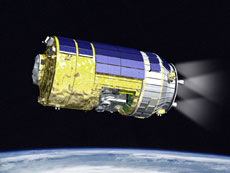
HTV (H-II Transfer Vehicle)

Japanese efforts in space are contributing to the world's space utilization and the global development of manned space technologies. Many people, and the most advanced Japanese space technologies, were involved in the development of Kibo. In addition, Japan is developing an unmanned cargo transportation vehicle for the ISS, called the H-II Transfer Vehicle (HTV). The first flight of the HTV is scheduled for 2009, after which we expect it to be launched about once a year, to support the operations of the ISS.
The astronauts who work on Kibo perform experiments and conduct research, but they are also required to maintain the space station. They change failed components, exchange the external hardware using the robotic arm, and may go out into space themselves to perform maintenance. In this sense, astronauts require advanced skills than ever before.
Q. Where are Japanese manned space activities heading in the future?
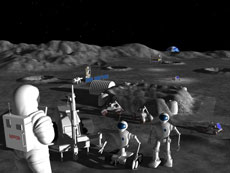
Lunar Base (Artist's concept)
The manned space exploration will definitely expand in the future. Human beings will stay in space for long periods with maintaining and managing space facilities. Thus, operating the ISS and the JEM “Kibo” is very important.
The current question is what should come after Kibo. I don't think the international cooperation achieved through the ISS program will vanish in 2015. It is likely that operation of the ISS will continue for several years after this date.
Meanwhile, the United States has announced that they intend to start manned lunar exploration by about 2020 and manned exploration of Mars sometime after that. Once the United States plans for lunar exploration become more concrete, Japan may move with the United States and participate in the construction of a lunar base.
There will be other options for Japan, too. JAXA would like to expand human activity in space through lunar and Martian exploration, rather than developing a second ISS. Even though the future of manned space activity points toward establishing a lunar base, Japan doesn't have its own manned spacecraft, so we depend on partners such as the United States and Russia for space transportation. We are also considering building our own manned spacecraft in the future, but there are a lot of issues to resolve, including national policy and budget issues. JAXA wants to come to a conclusion on this by about 2015.
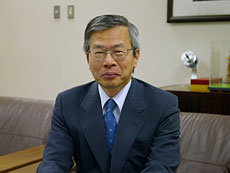

Q. What do you think is the most important quality required for an astronaut?
It is very important for an astronaut to have the ability to tell everyone in their country how precious it is to view the Earth from space and how important it is for our lives and the future of our planet to continue space activities. Astronauts get to have precious experiences that ordinary people will never have. Going to space is a very serious thing, and there is a heroic aspect to an astronaut who bravely flies away from Earth. When people see an astronaut's activities, they may think they'd like to go to space once in their lives, or perhaps they develop an ambition to become an astronaut. You might say that astronauts are the people that other people dream about.


Japanese Experiment Module "Kibo"
In March of this year, with Astronaut Takao Doi on board, assembly of the Japanese Experiment Module “Kibo” began. The first Japanese space facility was born, and many Japanese space expeditions will follow.
At the beginning of 2009, Astronaut Koichi Wakata will become the first Japanese person to take part in a long-duration expedition, lasting about three months. Five or six Japanese astronauts will stay on the ISS for a total of about 900 days from 2008 to 2015.
More Japanese astronauts will be required than the six we now have, since each mission will require several backup astronauts, and training and preparations before the launch take quite a long time. JAXA must begin to recruit new astronauts now to prepare for these future needs.
Q. How will this recruitment affect future Japanese manned space activities?

JAXA's Astronauts
Japanese manned space activities have originally been promoted together with the ISS program, which the United States actually started in 1985. In 1988, Japan decided to join the program, and Astronaut Mamoru Mohri became the first Japanese person to participate in a Space Shuttle mission in 1992. Under the initial plan, the ISS was scheduled to be completed by around 1994, but due to Space Shuttle accidents and other issues, the program was extensively delayed.
Astronauts Chiaki Mukai, Takao Doi, Koichi Wakata, Soichi Noguchi and Akihiko Hoshide followed Astronaut Mohri into space. Up to now, Japanese manned space activities have been performed mainly to get experience in space on Space Shuttle flights, in order to train astronauts and develop manned space flight technology. By developing and launching the Kibo module, Japan has earned the privilege of conducting long-duration expeditions. This is a first step into a new era of Japanese manned space activities. From now on, we will train astronauts to adapt to long-duration expeditions in space. I think this will give us the opportunity to create a great future for Japanese manned space exploration.
Q. How do you want to deploy or develop Japanese manned space activities based on the JEM Kibo?

HTV (H-II Transfer Vehicle)
Japanese efforts in space are contributing to the world's space utilization and the global development of manned space technologies. Many people, and the most advanced Japanese space technologies, were involved in the development of Kibo. In addition, Japan is developing an unmanned cargo transportation vehicle for the ISS, called the H-II Transfer Vehicle (HTV). The first flight of the HTV is scheduled for 2009, after which we expect it to be launched about once a year, to support the operations of the ISS.
The astronauts who work on Kibo perform experiments and conduct research, but they are also required to maintain the space station. They change failed components, exchange the external hardware using the robotic arm, and may go out into space themselves to perform maintenance. In this sense, astronauts require advanced skills than ever before.
Q. Where are Japanese manned space activities heading in the future?

Lunar Base (Artist's concept)
The current question is what should come after Kibo. I don't think the international cooperation achieved through the ISS program will vanish in 2015. It is likely that operation of the ISS will continue for several years after this date.
Meanwhile, the United States has announced that they intend to start manned lunar exploration by about 2020 and manned exploration of Mars sometime after that. Once the United States plans for lunar exploration become more concrete, Japan may move with the United States and participate in the construction of a lunar base.
There will be other options for Japan, too. JAXA would like to expand human activity in space through lunar and Martian exploration, rather than developing a second ISS. Even though the future of manned space activity points toward establishing a lunar base, Japan doesn't have its own manned spacecraft, so we depend on partners such as the United States and Russia for space transportation. We are also considering building our own manned spacecraft in the future, but there are a lot of issues to resolve, including national policy and budget issues. JAXA wants to come to a conclusion on this by about 2015.

Q. What do you think is the most important quality required for an astronaut?
It is very important for an astronaut to have the ability to tell everyone in their country how precious it is to view the Earth from space and how important it is for our lives and the future of our planet to continue space activities. Astronauts get to have precious experiences that ordinary people will never have. Going to space is a very serious thing, and there is a heroic aspect to an astronaut who bravely flies away from Earth. When people see an astronaut's activities, they may think they'd like to go to space once in their lives, or perhaps they develop an ambition to become an astronaut. You might say that astronauts are the people that other people dream about.
Dr. Kuniaki Shiraki
Executive Director, JAXA
Executive Director of the Human Space Systems and Utilization Mission Directorate
Dr. Shiraki graduated from the Department of Mechanical Engineering at Kyushu Institute of Technology in 1969. He completed the final term of his Ph.D. at the Department of Aerospace Engineering at the Graduate School of Engineering, Kyushu University, in 2000.
In 1972, Dr. Shiraki joined the National Space Development Agency (now part of JAXA). He was responsible for the development of satellites, including the Engineering Test Satellites ETS-I, and the Ionosphere Sounding Satellite, as well as the H-I Launch Vehicle. He has been involved in the ISS program since the preliminary study in 1985. In 2003, Dr. Shiraki was appointed Director of the Space Utilization Promotion Department, and also ISS Program Manager in the Office of Space Flight and Operations. He became an Associate Executive Director of JAXA in 2006 and an Executive Director in 2007.
Executive Director, JAXA
Executive Director of the Human Space Systems and Utilization Mission Directorate
Dr. Shiraki graduated from the Department of Mechanical Engineering at Kyushu Institute of Technology in 1969. He completed the final term of his Ph.D. at the Department of Aerospace Engineering at the Graduate School of Engineering, Kyushu University, in 2000.
In 1972, Dr. Shiraki joined the National Space Development Agency (now part of JAXA). He was responsible for the development of satellites, including the Engineering Test Satellites ETS-I, and the Ionosphere Sounding Satellite, as well as the H-I Launch Vehicle. He has been involved in the ISS program since the preliminary study in 1985. In 2003, Dr. Shiraki was appointed Director of the Space Utilization Promotion Department, and also ISS Program Manager in the Office of Space Flight and Operations. He became an Associate Executive Director of JAXA in 2006 and an Executive Director in 2007.
In Search of the Unknown Frontier
Going to Space as a Representative of Japan
An Intense Passion to Work in Space
Going to Space as a Representative of Japan
An Intense Passion to Work in Space